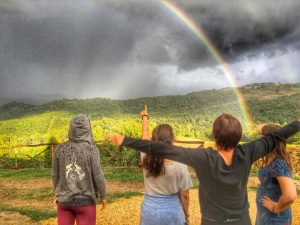By Kathleen Harris
In my freshman year of high school, I’d written something that my English teacher deemed “exceptional.” I was called to her desk after class, and praised for my creativity. A kind and encouraging letter was sent home to my parents as well, highlighting my potential.
I’d been writing since I sensed the pull of words — somewhere around age 4. Not short stories, of course, but angular, awkward attempts at words — and their accompanying stick-figure illustrations — to highlight my frustrating attempts at communication. In our Queens apartment, my mother would find torn envelope flaps, seventies singer-songwriter album sleeves, and my parents’ own high school yearbooks, all adorned with my pencil-scratch efforts at language.
As a child, I knew that words could be soft and loud. Words hurt, and they healed. They allowed me to escape into books containing bright, colorful pictures, and enabled me to get lost in the mystical lyrics printed on double-fold album covers. I’d take stacks of books to my Raggedy Ann-covered twin bed, hugging them to my small chest and leaping over the sharks I thrilled myself into believing were swarming in the churn of parquet bedroom floor below. I was on a life raft, safe in my room, happily adrift with words.
At my Catholic grammar school, I wrote essays about public sanitation and Jesus, stories about ice cream and vicious dogs, and third-grade analyses of St. Elizabeth and Judy Blume. I liked to write. Time stopped when I hunched over looseleaf paper at our kitchen table, lost in the space between the hand-drawn margins.
I never had proclivity for math. An elderly substitute teacher, covering for my fourth grade teacher on bedrest for the duration of her pregnancy, had bled me dry of math competence. She thwacked a ruler on our classroom desks in exasperation, desperate for her charges to grasp the concept of fractions, and leaving me terrified of incorrect answers. The essays, by contrast, earned me gold stars and puffy kitten stickers. I knew where my childhood bread was buttered. I kept writing.
My mother sensed the shift in my demeanor as the teenage years beckoned. I was darker, hormonal, fifteen. Some of it was entirely justified. She knew what I had seen, what I had witnessed, and what she and my father and their circumstances hadn’t always been able to offer me. When the letter from my English teacher arrived, she was proud, and left it on the kitchen counter for my father to read later that evening. But she also said this — something so piercing, so marking, that I can still place myself precisely in the moment, and in the room where I was standing when she uttered them — just don’t write about us, Kathleen. You can’t write about us. I went silent in her articulation of those words, stunned by her hastily-tied gag.
That knee-jerk statement from the overworked mother of a moody teenager shrouded my burgeoning creativity. It was an impulsive, momentary thought, of course — one uttered before considering its effects. It meant no harm at the outset, mere self-preservation from a fragile soul. Yet, it marked me, as ordinary moments in life so often do. I’ve repeated the sentence to college professors and boyfriends, when pressed, and to some workshop friends who ask why I’m not writing so much anymore. As an only child in a stoic Irish home, I often served as my mother’s confidant and protector. At times, telling still feels like betrayal. Her comment remains as a personal albatross, and a terribly convenient excuse for a writer doubting her ability. at 46, I still struggle with her statement.
When my daughter expressed an interest in — and a talent for — creative writing, I was thrilled, even as my mother’s words still tugged at my sleeve. I was determined to undo the damage, even if I hesitated at the thought of my daughter’s own discerning voice. She had seen and witnessed my failings as well. So say all mothers and daughters, I suppose.
Over the summer, my daughter announced that she would be joining her high school’s literary magazine. There may be no prouder moment for a writer-mother like myself. Recently, she learned that her first piece was accepted for publication, with minor edits from the student editorial staff. “That’s boilerplate,” I told her, after whooping and hollering and high-five-ing her in our kitchen, swelling with pride. “The strongest writers consider constructive criticism.”
I told her — as I have in the past — write your life, baby. Write what you know. You have a voice in the world. Then, this worry surfaced. Was I veering from my own pain, and driving her to her own? Was I charging her towards vulnerability, headlong into too much truth? Was she ready to write her life?
My father is nearly 70, and has long struggled with becoming a writer. When I was growing up, stacks of legal pads and moleskin notebooks sat untouched on a dusty desk in our guest room. He kept the door closed, and watched John Wayne and Humphrey Bogart movies on Sunday afternoons instead. He’d seen their movies dozens of times, and knew the outcomes. He would never fail as these cinematic heroes’ silent companions. The Union Army would be victorious. The leading man would get the girl. Those two guys in Morocco would embark on the beginning of a beautiful friendship. Writing — and life — didn’t offer him such guarantees.
So here my daughter stands now, a burgeoning writer herself, insisting that it isn’t really a big deal to have her work accepted, even though her broad smile and bright eyes suggest otherwise. I read a few of the essay’s passages out loud to her father, marveling at her comic ability, and her keen view of our decidedly eclectic family. I am so happy for her. I am so frightened for her. I know what it is to work the mental mines, to toil for hours on what seems a bulging vein in the sediment, and find it to be fool’s gold instead. I know what it is to be a teenager, to have large thoughts in a small room, and to have impulses and fears that poor choices can seemingly quell. I know what it is to feel pain, to fail, to question. I know what it is to be alive. Her father and I brought her here for just that purpose: to live. Yet, as her mother, the instinct still rises to protect her from the very gift we have bestowed. Another stark duality of parenting.
Still, I decide this, as her mother and current counsel: it is wiser to face truth and stand beside it. It is better to keep the door open to possibility. It shouldn’t stay shut, even if there are scary, loud noises coming from behind it. It is better to be who you are, in spite of fear and doubt. If, dear daughter, you are a writer as you know yourself to be — then be exactly that.
Write about forgotten childhood toys, and late-night drives on the thruway. Write about Christmas mornings and Thanksgiving nights. Write about secret crushes and scenes on Manhattan streets. Write about true love and false hopes. Write about your father. Write about me. Write about your brother. Write about the dog. Or don’t. It is your pen to hold, and your story to tell.
Write what moves you. Write what you know to be true. Write it all, baby. Write your life.

